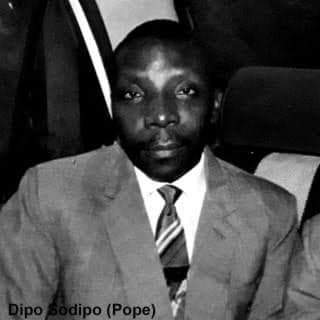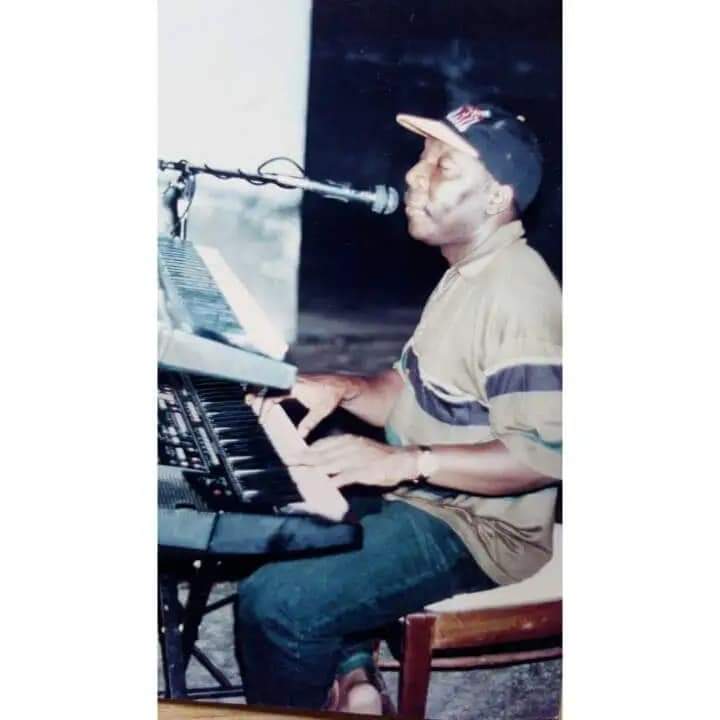Remembering Dipo Shodipo, Pope of the Basillica

His baritone was like no other.
Deep, obviously.
Rumbling and tightly controlled so that he could thin it out into a lacquered tenor or hollow it for a deeper booming texture.
His name was Dipo Sodipo. His sobriquets were numerous but the Pope seemed to have been his preferred. He was the Czar of the One Man Band, a popular fixture of the Yoruba music scene of the late 80s and 90s.

The shrinking of bands at the time could have been an economical response to the austerity that did not exclude the music scene, but a one man band demands a level of ambidexterity Pope handled effortlessly. To hold a note on a microphone and hoist a piano chord simultaneously is truly the stuff of genius.
Dipo Sodipo at work
Witness the one man band: usually, a pre-programmed percussive rhythm runs amok on his keyboard. Then he gives chase with his vocals, punctuating with simple piano riffs. Ever so often, he allows flourishes of complicated piano chords—but this technical verbiage hardly accounts for how well rendered his music is.
Before Wizkid and Lax rendered the femme fatale Caro, Dipo Sodipo had updated the fair skinned lady who may or may not have been the subject of Rex Lawson’s soulful tune, ‘Yellow Sisi’.
Every one remembers the first time they heard Dipo Sodipo. Mine was circa 2004. Travelling at top speed in my cousin’s car on Road 1, OAU Campus, Ile-Ife, windows down with the consequent rush of wind competing with his booming baritone. The song was “Mowo Kuro Leran”, a slightly up-tempo ditty about living in the moment.
The music felt unmistakably atmospheric and claustrophobic at the same time. The programmed rhythm running haywire as always. Pope had died at this time. The circumstances of his passing is hydra headed as is customary of early deaths. Was it a kidney ailment? Did he live precariously on the edge? Did he give himself to alcohol and other potent poisons?
As with unsung legends, Dipo Sodipo still draws blanks on the internet. There is hardly a biography extending beyond a paragraph. The quick summary of his public life is that he was a keyboardist and vocalist. He was known to be a renegade highlife musician. I wonder if you can really categorize his music as highlife. Rather, it feels like a fusion of folk songs, blues, soul, highlife, juju music and a recourse to gospel ever so often.
The philosophy imbued in his practice is that of the Yoruba everyman whose worldview is to attempt to be good whilst definitely doing no harm. Throw in a good time—and you will understand why Dipo Sodipo was a keggite, that youthful social group invested in mirth making and palmwine drinking.
He was said to have formed another group called Basillica which unlike Keggites made a cocktail of beer and palmwine. Perhaps his nickname Pope is predicated on the Basillica.
Dipo Sodipo was physically present in Ibadan in the 80s where he studied music and became the Head of Department at the Polytechnic. He was also the lead singer of K12 Voices, before he broke out as a one man act.
He would belt out memorable medleys like the soulful “Iya ni wura”, the lively “Jekowo Wole Mi” and the cautionary “Bola Bade”. Running through his songs, besides his light sermonising, is a social commentary that aligns both with the Yoruba worldview and urgent contemporary realities.
Might I add that Dipo Sodipo’s cult fame was smack in the middle of one of Nigeria’s most devastating streaks of military rule? A time when even the vivacious party-loving essence of the Yoruba was threatened by widespread insecurity and a struggling economy—Pope was a fixture of Abeokuta parties.
Being an Egba man himself, he was loved both at home and abroad. By abroad, I am referring to the sleepy university town of Ado-Ekiti where a certain medical doctor, wading through a painful separation, found succour in the soulful songs of Dipo Sodipo some thirty years ago. By abroad, I am referring to the busy city of London, from where I write, a YouTube playlist of his songs playing in the background.
Decades after his passing, Dipo Sodipo’s music remains relevant to his growing array of fans
By Dami Ajayi




